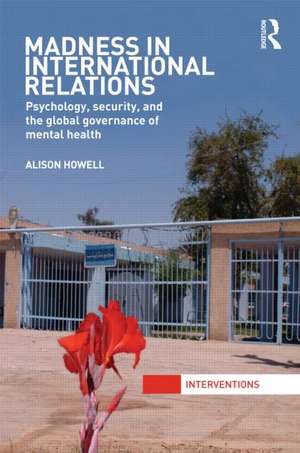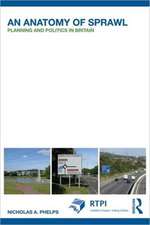Madness in International Relations: Psychology, Security, and the Global Governance of Mental Health: Interventions
Autor Alison Howellen Limba Engleză Hardback – iun 2011
Through the analysis of three key case studies Howell illustrates how such therapeutic interventions can at times be coercive and sovereign, at other times disciplinary, and at still other times benevolent, though not benign. In each case a ‘diagnostic competition’ is traced, that is, a contestation over how best to diagnose and treat the population in question. The book examines the populations of Guantánamo Bay, post-conflict societies and western militaries, identifying how these diagnostic competitions ultimately rest on shared assumptions about the value of psychology and psychiatry in managing global security, about the value of achieving security through mental health governance, and ultimately about the medicalization of security.
This work will be of great interest to all scholars of International relations, critical theory and security studies.
| Toate formatele și edițiile | Preț | Express |
|---|---|---|
| Paperback (1) | 462.43 lei 6-8 săpt. | |
| Taylor & Francis – 13 iun 2013 | 462.43 lei 6-8 săpt. | |
| Hardback (1) | 1055.06 lei 6-8 săpt. | |
| Taylor & Francis – iun 2011 | 1055.06 lei 6-8 săpt. |
Din seria Interventions
-
 Preț: 297.79 lei
Preț: 297.79 lei -
 Preț: 310.65 lei
Preț: 310.65 lei -
 Preț: 309.41 lei
Preț: 309.41 lei -
 Preț: 319.01 lei
Preț: 319.01 lei -
 Preț: 327.40 lei
Preț: 327.40 lei -
 Preț: 156.44 lei
Preț: 156.44 lei -
 Preț: 128.80 lei
Preț: 128.80 lei - 9%
 Preț: 1041.01 lei
Preț: 1041.01 lei -
 Preț: 112.30 lei
Preț: 112.30 lei -
 Preț: 123.84 lei
Preț: 123.84 lei -
 Preț: 302.17 lei
Preț: 302.17 lei -
 Preț: 286.66 lei
Preț: 286.66 lei -
 Preț: 309.65 lei
Preț: 309.65 lei -
 Preț: 111.26 lei
Preț: 111.26 lei -
 Preț: 312.36 lei
Preț: 312.36 lei -
 Preț: 309.70 lei
Preț: 309.70 lei -
 Preț: 311.48 lei
Preț: 311.48 lei -
 Preț: 379.30 lei
Preț: 379.30 lei -
 Preț: 279.25 lei
Preț: 279.25 lei -
 Preț: 189.29 lei
Preț: 189.29 lei -
 Preț: 303.01 lei
Preț: 303.01 lei -
 Preț: 342.07 lei
Preț: 342.07 lei -
 Preț: 443.86 lei
Preț: 443.86 lei - 18%
 Preț: 999.51 lei
Preț: 999.51 lei - 25%
 Preț: 880.72 lei
Preț: 880.72 lei - 18%
 Preț: 1057.05 lei
Preț: 1057.05 lei - 18%
 Preț: 1001.90 lei
Preț: 1001.90 lei -
 Preț: 411.42 lei
Preț: 411.42 lei - 18%
 Preț: 1005.04 lei
Preț: 1005.04 lei - 18%
 Preț: 703.61 lei
Preț: 703.61 lei - 18%
 Preț: 1108.73 lei
Preț: 1108.73 lei - 18%
 Preț: 699.96 lei
Preț: 699.96 lei - 18%
 Preț: 1005.04 lei
Preț: 1005.04 lei -
 Preț: 409.69 lei
Preț: 409.69 lei - 18%
 Preț: 1055.32 lei
Preț: 1055.32 lei - 18%
 Preț: 1109.99 lei
Preț: 1109.99 lei - 18%
 Preț: 1056.00 lei
Preț: 1056.00 lei -
 Preț: 393.86 lei
Preț: 393.86 lei - 18%
 Preț: 1113.95 lei
Preț: 1113.95 lei - 18%
 Preț: 1111.72 lei
Preț: 1111.72 lei - 18%
 Preț: 1053.79 lei
Preț: 1053.79 lei -
 Preț: 393.93 lei
Preț: 393.93 lei - 18%
 Preț: 1059.48 lei
Preț: 1059.48 lei - 26%
 Preț: 822.36 lei
Preț: 822.36 lei -
 Preț: 416.26 lei
Preț: 416.26 lei - 18%
 Preț: 1282.19 lei
Preț: 1282.19 lei
Preț: 1055.06 lei
Preț vechi: 1286.66 lei
-18% Nou
Puncte Express: 1583
Preț estimativ în valută:
201.89€ • 215.89$ • 168.33£
201.89€ • 215.89$ • 168.33£
Carte tipărită la comandă
Livrare economică 17 aprilie-01 mai
Preluare comenzi: 021 569.72.76
Specificații
ISBN-13: 9780415576260
ISBN-10: 0415576261
Pagini: 200
Ilustrații: 2 b/w images, 1 halftone and 1 line drawing
Dimensiuni: 156 x 234 x 13 mm
Greutate: 0.46 kg
Ediția:1
Editura: Taylor & Francis
Colecția Routledge
Seria Interventions
Locul publicării:Oxford, United Kingdom
ISBN-10: 0415576261
Pagini: 200
Ilustrații: 2 b/w images, 1 halftone and 1 line drawing
Dimensiuni: 156 x 234 x 13 mm
Greutate: 0.46 kg
Ediția:1
Editura: Taylor & Francis
Colecția Routledge
Seria Interventions
Locul publicării:Oxford, United Kingdom
Public țintă
Postgraduate and UndergraduateCuprins
1. Madness in IR: An Introduction 2. Security, Order, Control: From Anti-Politics to Ethico Politics 3. Approaching Madness:the Psy Disciplines in Critical Perspective 4. Victims or Madmen? The Diagnostic Competition over ‘Terrorist’ Detainees at Guantánamo Bay 5. The Diagnostic Competition over Post-Conflict Populations: Merging the Psychosocial and Mental Health Models 6. Ordering Soldiers: Contesting Therapeutic Practices in the Canadian Military 7. Conclusion: The Global Politics of Governing Mental Health
Recenzii
Whereas conventional international relations might consider the knowledge and the management of the psyche to belong to the domain of the psy sciences, and therefore to lie outside the scholarly world of international relations theory, Howell insists that psy sciences be treated as political sciences. This move makes Madness in International Relations an important and imaginative contribution to the genealogy of international rule and its contestation.
William Walters, Carleton University.
Howell takes us into the heart of the dark absurdities of the use of psychological discourses in the war on terror. With an astute comparison of three actors in that war – Gitmo detainees, post-conflict survivors, and the Canadian military – she shows how the struggle for security and order happens through psychological/psychiatric disciplines and discourses. She not only describes these three cases in all their richness, but attends to what is lost and gained in these struggles to define psychiatric disorder, including military budget dollars, the denial of agency, and the threat of the collapse of politics altogether into the field of governance. A sharp and compelling introduction to the relationship between madness and the psychiatric science of war.
Catherine Lutz, Brown University.
Over the past 15 years, psycho-trauma has become a catchword for NGO's, the military and the media. Nowadays, battalions of psy workers roam the scenes of natural and man-made disasters. This important book provides a brilliant and timely analysis of how psy discourses and practices are implicated in broader security agendas. Essential reading for all those interested in the ethics of medical practices or the politics of global security.
Rony Brauman, former president of Médecins Sans Frontières (MSF).
Alison Howell provocatively places madness at the centre of international relations and challenges us to rethink international security, order and politics through historicising their limits. Passionately argued, this book explores the insidious operations of the ‘psy disciplines’ in liberal regimes and risk management. Inspired by Foucault’s genealogical analyses, Howell’s shift towards an ethico-politics of effects in security studies should be read by all those with an interest in critical IR.
Claudia Aradau, Open University.
William Walters, Carleton University.
Howell takes us into the heart of the dark absurdities of the use of psychological discourses in the war on terror. With an astute comparison of three actors in that war – Gitmo detainees, post-conflict survivors, and the Canadian military – she shows how the struggle for security and order happens through psychological/psychiatric disciplines and discourses. She not only describes these three cases in all their richness, but attends to what is lost and gained in these struggles to define psychiatric disorder, including military budget dollars, the denial of agency, and the threat of the collapse of politics altogether into the field of governance. A sharp and compelling introduction to the relationship between madness and the psychiatric science of war.
Catherine Lutz, Brown University.
Over the past 15 years, psycho-trauma has become a catchword for NGO's, the military and the media. Nowadays, battalions of psy workers roam the scenes of natural and man-made disasters. This important book provides a brilliant and timely analysis of how psy discourses and practices are implicated in broader security agendas. Essential reading for all those interested in the ethics of medical practices or the politics of global security.
Rony Brauman, former president of Médecins Sans Frontières (MSF).
Alison Howell provocatively places madness at the centre of international relations and challenges us to rethink international security, order and politics through historicising their limits. Passionately argued, this book explores the insidious operations of the ‘psy disciplines’ in liberal regimes and risk management. Inspired by Foucault’s genealogical analyses, Howell’s shift towards an ethico-politics of effects in security studies should be read by all those with an interest in critical IR.
Claudia Aradau, Open University.
Descriere
This book provides a novel approach to the study of security and global governance by demonstrating that psychological interventions are integral to global governmentality.
















